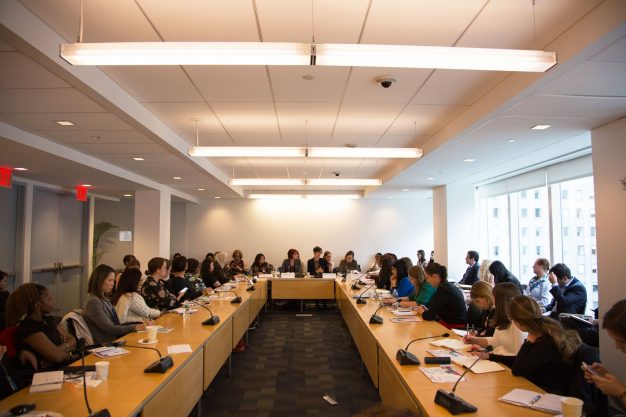Download the Press Release in PDF here
NEW YORK, USA – Twenty years of implementation of the Beijing Declaration and Platform for Action (BPfA), as well as a Global Study on United Nations Security Council Resolution (UNSCR) 1325 implementation underway, provides us with a unique opportunity to revisit the values driving the peace and security agenda from a critical gender perspective. During the panel discussion “A Transformative Women, Peace and Security Agenda: The Need to Challenge Militarism”, representatives of the Women Peacemakers Program (WPP), SAMYAK, Saferworld, WILPF and the Consortium on Gender, Security and Human Rights argued that a transformative Women, Peace & Security (WPS) agenda can only be achieved by challenging militarism and underlying gender constructions. The panel discussion took place on the occasion of the 59th session of the Commission on the Status of Women, on March 10, 2015, in the Church Center, and was moderated by Netsai Mushonga.
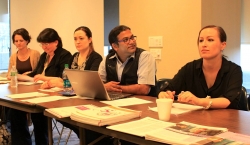 Within its holistic approach towards achieving gender-just societies, “Beijing” recognized the link between achieving peace and the advancement of women’s rights. It went beyond the notion of adding women to existing peace and security structures by challenging cultures of militarism, calling for the global reduction of military expenditures, disarmament and investing in conflict prevention and nonviolent alternatives to deal with conflict. Given the persistent challenges to implement the WPS agenda, and with “1325” under critical review this year, panelists looked back at the critical gender framework offered by the BPfA, and the opportunities this framework provides us with in terms of reclaiming and redefining peace and security for the years to come.
Within its holistic approach towards achieving gender-just societies, “Beijing” recognized the link between achieving peace and the advancement of women’s rights. It went beyond the notion of adding women to existing peace and security structures by challenging cultures of militarism, calling for the global reduction of military expenditures, disarmament and investing in conflict prevention and nonviolent alternatives to deal with conflict. Given the persistent challenges to implement the WPS agenda, and with “1325” under critical review this year, panelists looked back at the critical gender framework offered by the BPfA, and the opportunities this framework provides us with in terms of reclaiming and redefining peace and security for the years to come.
Looking back at the transformative values of BPfA, Hannah Wright (Saferworld) voiced her concern that UNSCR 1325 implementation has in itself become militarized. If the focus remains on mitigating the effects of war (“making war safer for women”), instead of preventing war itself, she stated, we rob ourselves of the opportunity to build sustainable peace for all through a truly gendered reframing of violent conflict and the interventions we develop to address it.
Isabelle Geuskens (WPP) wondered what has happened to our feminist agenda along the way: “Yes, we got our Women, Peace and Security resolutions, but what happened to our Women, Peace and Security revolution? Only when we go beyond the current patriarchal peace and security paradigm and address, on multiple levels, the deeply gendered dynamics sustaining cultures of militarism – including with men, through a masculinities approach - can we implement a transformative WPS agenda.”
Looking at the intersections between masculinism and militarism, Anand Pawar elaborated on the conceptual similarities between these two concepts, both ideologies supporting the supremacy of militaries and masculinities in order to defend or promote national interests. Linking it to the contemporary macro-economic world, militarization helps vested powers to maintain control over natural resources for their own benefits. When talking about transforming these mechanisms, he advocated that it must be clear what must be transformed, with a need to incorporate a feminist political agenda at every step along the way.
Reflecting on 100 years of WILPF’s existence, Abigail Ruane (WILPF) noted that the challenges for creating peaceful societies have hardly changed: patriarchal notions of peace, large availability of weapons, and enormous financial investments into a war economy. “With the narrowing of UNSCR 1325, we have seen issues falling off the wagon. When analyzing the BPfA reviews of this year, we were concerned to see the lack of disarmament efforts not even being mentioned as a gap.”
According to Carol Cohn (Consortium on Gender, Security and Human Rights), UNSCR 1325 had a relatively narrow agenda from the start. Due to both the need to fit within the mandate of the Security Council and Council member state politics, many transformative elements never made it into the Resolution. She called for a change of focus in regards to women’s participation in peace processes: “Instead of focusing only on getting women to the peace table, we should focus on what women are able to put on the table. Feminist analyses of issues normally seen as outside the WPS agenda, such as how to rebuild infrastructure, or how to deal with extractive industries, land grabbing, and livelihood issues, are crucial if women’s participation is to lead to sustainable peace.”
At the end of the panel discussion, WPP announced a joint action research with Cordaid and GPPAC on the persistent structural barriers in regards to UNSCR 1325 implementation. The research will build on the insights provided during the panel discussion, and will be launched in October 2015, to coincide with the 15th anniversary of UNSCR 1325.
The speeches of the panelists, will be made available soon via: www.womenpeacemakersprogram.org
[END]
Download the Press Release in PDF here
List of Speakers:
 The Women Peacemakers Program has been established in 1997 to support and empower women peace activists. WPP actively advocates for the recognition of women’s experiences and peacebuilding contributions during war and conflict and the integration of a gender perspective in peacebuilding processes. The Women Peacemakers Program ’s vision is of a world where women and men work together as allies to build communities where people co-exist peacefully through active nonviolence. Its mission is to support the empowerment of gender-sensitive women and men for the transformation of conflict through active nonviolence. In 2014, WPP analyzed the multi-layered linkages between gender and militarism in relation to the persistent obstacles for a transformative approach to UNSCR 1325 implementation. From July 2-4, 2014, WPP organized the Global Consultation “Gender & Militarism: Analyzing the Links to Strategize for Peace” with over 70 academics and activists from all over the world discussing the linkages between gender and militarism. Following the Consultation, WPP published a Policy Brief on Gender and Militarism. In 2014, WPP also launched its annual May 24 pack “Gender & Militarism: Analyzing the Links to Strategize for Peace”, comprising of 23 articles written by leading academics, pioneering women peace activists and civil society representatives from all over the world.
The Women Peacemakers Program has been established in 1997 to support and empower women peace activists. WPP actively advocates for the recognition of women’s experiences and peacebuilding contributions during war and conflict and the integration of a gender perspective in peacebuilding processes. The Women Peacemakers Program ’s vision is of a world where women and men work together as allies to build communities where people co-exist peacefully through active nonviolence. Its mission is to support the empowerment of gender-sensitive women and men for the transformation of conflict through active nonviolence. In 2014, WPP analyzed the multi-layered linkages between gender and militarism in relation to the persistent obstacles for a transformative approach to UNSCR 1325 implementation. From July 2-4, 2014, WPP organized the Global Consultation “Gender & Militarism: Analyzing the Links to Strategize for Peace” with over 70 academics and activists from all over the world discussing the linkages between gender and militarism. Following the Consultation, WPP published a Policy Brief on Gender and Militarism. In 2014, WPP also launched its annual May 24 pack “Gender & Militarism: Analyzing the Links to Strategize for Peace”, comprising of 23 articles written by leading academics, pioneering women peace activists and civil society representatives from all over the world.
www.womenpeacemakersprogram.org
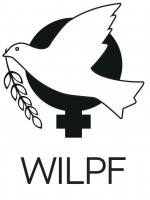 PeaceWomen is a program of the Women’s International League for Peace and Freedom (WILPF), the longest-serving women’s peace organization, founded in 1915. PeaceWomen has three pillars of work: Accountability, Inclusive Participation and Conflict Prevention. Its portfolio of tools and projects range from policy advocacy at the United Nations to local capacity building. They work to advance the Women, Peace, and Security Agenda through their mission, team, partners, strategy, and outreach. WILPF started as a movement in 1915 when 1,200 women from a diversity of cultures and languages came together in The Hague during the First World War, to study, make known and eliminate the causes of war. WILPF’s mission is to end and prevent war, ensure that women are represented at all levels in the peace-building process, defend the human rights of women, and promote social, economic and political justice.
PeaceWomen is a program of the Women’s International League for Peace and Freedom (WILPF), the longest-serving women’s peace organization, founded in 1915. PeaceWomen has three pillars of work: Accountability, Inclusive Participation and Conflict Prevention. Its portfolio of tools and projects range from policy advocacy at the United Nations to local capacity building. They work to advance the Women, Peace, and Security Agenda through their mission, team, partners, strategy, and outreach. WILPF started as a movement in 1915 when 1,200 women from a diversity of cultures and languages came together in The Hague during the First World War, to study, make known and eliminate the causes of war. WILPF’s mission is to end and prevent war, ensure that women are represented at all levels in the peace-building process, defend the human rights of women, and promote social, economic and political justice.
www.peacewomen.org / www.wilpfinternational.org
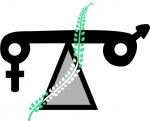 SAMYAK is registered as a Communication and Resource Centre on gender, masculinities, health and development. Its vision is the promotion of gender equitable, violence free society and safeguarding human rights of all individuals to lead a fearless and meaningful life. Based in Pune, SAMYAK works through collaborative partnerships and advocacy initiatives with voluntary and people’s organizations, social and political groups, media, and society at large, to promote gender equity and justice and to advocate human rights of all individuals. SAMYAK believes that there is need for innovative communication strategies, materials and programs to reach out to ‘un-reached’ groups in society, especially men. SAMYAK is actively collaborating with Women Peacemaker Program (WPP) on inclusion of masculinities perspective in Women, Peace and Security agenda since 2009. SAMYAK is involved in capacity building of NGOs and INGOs in the area of masculinities and working with men. SAMYAK is active in networking with various social justice movements and individuals to involve them in work with Gender-Sensitive Active Nonviolence. It is also involved in advocating sexual and reproductive health rights of urban poor women.
SAMYAK is registered as a Communication and Resource Centre on gender, masculinities, health and development. Its vision is the promotion of gender equitable, violence free society and safeguarding human rights of all individuals to lead a fearless and meaningful life. Based in Pune, SAMYAK works through collaborative partnerships and advocacy initiatives with voluntary and people’s organizations, social and political groups, media, and society at large, to promote gender equity and justice and to advocate human rights of all individuals. SAMYAK believes that there is need for innovative communication strategies, materials and programs to reach out to ‘un-reached’ groups in society, especially men. SAMYAK is actively collaborating with Women Peacemaker Program (WPP) on inclusion of masculinities perspective in Women, Peace and Security agenda since 2009. SAMYAK is involved in capacity building of NGOs and INGOs in the area of masculinities and working with men. SAMYAK is active in networking with various social justice movements and individuals to involve them in work with Gender-Sensitive Active Nonviolence. It is also involved in advocating sexual and reproductive health rights of urban poor women.
www.samyakindia.org
 The Consortium on Gender, Security and Human Rights is working to create a more peaceful, just and gender equitable world through programs designed to: produce cutting edge gender analysis of war and peacebuilding; transform gender and security research and policy agendas; and foster innovative education, activism and practice. It seeks to catalyze cross-disciplinary conversations to create the multidimensional, structural, feminist gendered analyses that are imperative to finding sustainable and just solutions -- not only to wars, but to the political, social, economic and environmental crises that underlie them.
The Consortium on Gender, Security and Human Rights is working to create a more peaceful, just and gender equitable world through programs designed to: produce cutting edge gender analysis of war and peacebuilding; transform gender and security research and policy agendas; and foster innovative education, activism and practice. It seeks to catalyze cross-disciplinary conversations to create the multidimensional, structural, feminist gendered analyses that are imperative to finding sustainable and just solutions -- not only to wars, but to the political, social, economic and environmental crises that underlie them.
www.genderandsecurity.org
 Saferworld is an independent international organization working to prevent violent conflict and build safer lives. They work with local people affected by conflict to improve their safety and sense of security, and conduct wider research and analysis. Using this evidence and learning to improve local, national and international policies and practices that can help build lasting peace. Their priority is people – believing that everyone should be able to lead peaceful, fulfilling lives, free from insecurity and violent conflict.
Saferworld is an independent international organization working to prevent violent conflict and build safer lives. They work with local people affected by conflict to improve their safety and sense of security, and conduct wider research and analysis. Using this evidence and learning to improve local, national and international policies and practices that can help build lasting peace. Their priority is people – believing that everyone should be able to lead peaceful, fulfilling lives, free from insecurity and violent conflict.
www.saferworld.org.uk
12 Dec '17 Today, we are pleased to share with you the Conference Report “Financial Inclusion for Freedom and Security” by the Women Peacemakers Program, Duke Law International Human Rights Clinic, Human Security Collective, Transnational Institute, the Charity & Security Network, in cooperation with the Knowledge Platform Security and Rule of Law.
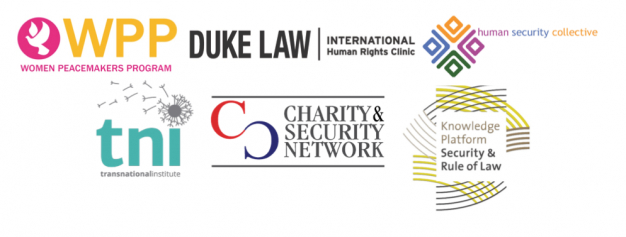
7 Dec '17 Today, on the 13th day of the 16 Days of Activism Against Gender Violence Campaign, we bring you the sad news that from 15 December onwards, the Women Peacemakers Program (WPP) will have to close its doors. We would like to ask for your time to read what has driven us to make this decision.
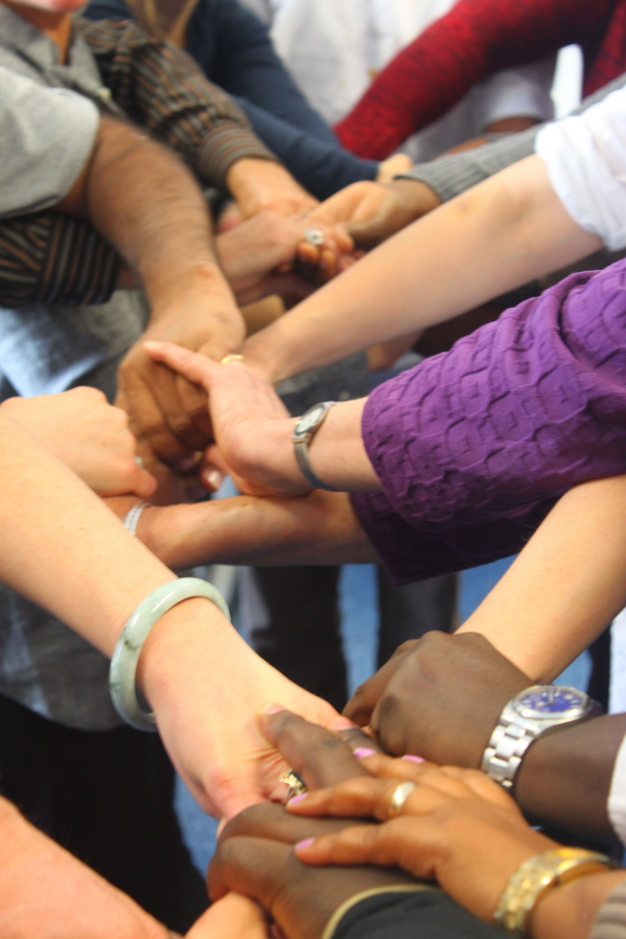
7 Nov '17 On Thursday, 26 October 2017, a side event entitled, “Pulling the Rug from Under Our Feet: What is the UNSCR 1325 Without Civil Society Freedoms?” was hosted on the margins of the 17th anniversary of United Nations Security Council Resolution (UNSCR) 1325. The event was hosted by the Women Peacemakers Program (WPP) and the Dutch Mission, in collaboration with Duke Law’s International Human Rights Clinic, Al-Hayat Center for Civil Society Development, Arab Women Organisation of Jordan, NOVACT, Free Sight Association, Iraqi Al-Amal Association, Women Empowerment Organisation, NGO Working Group on Women, Peace and Security and Women’s International League for Peace and Freedom. This article briefly looks at the main issues discussed during the event.
